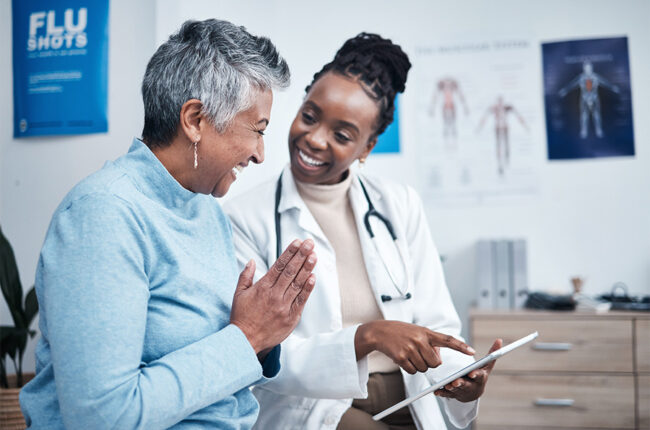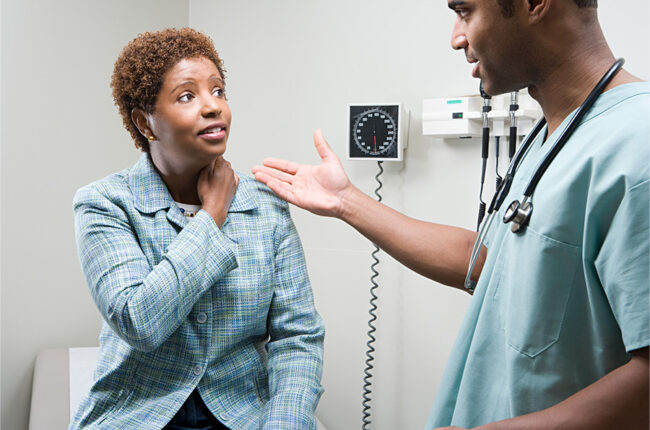According to the World Health Organization, between 30–50% of all cancer cases are preventable. Certain unhealthy daily behaviors can increase our risk of developing cancer. Major lifestyle changes may not happen overnight, but working toward healthier habits can significantly reduce the likelihood of cancer. Practices like making time each day for physical activity, choosing healthier food options, and prioritizing regular checkups and screenings can all contribute to cancer prevention.
Here are some steps you can take that may help prevent cancer and pave the way for a long and healthy life:
Quit smoking.
When you quit smoking, you lower your risk of many types of cancer. These include cancers of the lung, bladder, kidneys, pancreas, cervix, mouth, esophagus, and throat.
Make healthy food choices.
Your diet should include:
- Plenty of vegetables, fruits, beans, other legumes, fish, poultry, and whole grains.
- Less red meat (such as beef, lamb, and pork).
- Less processed meat (like bacon, hot dogs, sausage, and some deli meats).
- Less food made from refined grains.
- Less sweets and added sugars.
Find inspiration from our recipe library!
Maintain a healthy weight.
Being very overweight increases the risk of some forms of cancer. People whose extra body fat sits in the waist area may be at higher risk than people whose extra fat is in their hips or thighs.
Stay active.
Being active every day may prevent several cancers. And regular activity can help you get to and stay at a healthy weight. Being active and getting enough sleep may work together to lower cancer risk even more than activity alone, especially for women.
You can join free movement classes, in-person or virtually, on our class calendar! Or visit our video library for on-demand classes to take whenever and wherever you wish!
Protect your skin.
Most skin cancer is caused by too much sun. To protect yourself from damaging UV rays:
- Seek shade from 10 a.m. to 4 p.m.
- Cover up outdoors with a wide-brimmed hat and tightly woven clothing.
- Apply broad-spectrum sunscreen on any exposed skin, even when it’s cloudy. Use SPF 30 or higher. Reapply if you’re in the sun for more than a few hours.
- Wear UV-blocking sunglasses.
- Avoid tanning booths and sunlamps.
Be wise with alcohol.
Drinking alcohol may increase your risk of some types of cancer. Any amount of alcohol may increase that risk. If you drink alcohol, try to limit the amount you drink.
Practice safer sex.
Safer sex includes using condoms and talking to every potential sex partner about their sexual history. Practicing safer sex helps prevent HPV, a sexually transmitted infection that can cause cervical cancer.
Get regular checkups and screenings.
Your doctor can schedule regular screenings for various types of cancer, such as mammograms for breast cancer and stool tests for colon cancer. Most screenings and checkups are to find cancer early, when it’s easier to treat and may even be curable.
Read this blog and download a free infographic for screening recommendations based on age.
Consider vaccinations.
Females ages nine to 26 can get the HPV vaccine to protect against the virus that can cause cervical cancer. Males ages nine through 26 may also get the HPV vaccine, which may prevent anal cancer and oral cancer. If you are age 27 to 45 and have not been vaccinated for HPV, ask your doctor if getting the vaccine is right for you.
Avoid toxins at work and at home.
Stay away from harmful chemicals and other things that can increase your chances of getting cancer. These things include asbestos, benzene, radon, and polluted drinking water. Take care when you use cleaning products, paints, solvents, and pesticides.
Making healthier life choices and sticking to them can be challenging, but you don’t have to do it alone. At the VEBA Resource Center, our Care Navigators are here to support and guide you toward becoming your best self. Together, you’ll create a tailored health plan for you based on your unique story, values, and experiences.









